Achievements 2011–12
The Library’s vision is an informed Parliament supported by a Library that delivers services to meet client needs. Achievements are described against the Library’s strategic priorities.
Create the 21st century Parliamentary Library and research services
A major focus for the Library is creating services and products that meet the needs of Senators, Members, their staff, and the chamber departments in their work in supporting Senators and Members, in the 21st century.
Client evaluation of library services
The Library conducts a review of the needs of clients once in each Parliament. LeapFrog Research was chosen via select tender to undertake the independent review for the 43rd Parliament. The research objectives were to determine:
- the overall levels of satisfaction with Library services;
- the extent to which services are provided on a balanced, impartial, confidential and consistent and timely basis;
- areas/instances where the information and research needs of the 43rd parliament are not adequately being met; and
- any changing information needs of clients.
The evaluation methodology comprised a mix of qualitative interviews and a targeted online survey open to Senators and Members and their staff. The Report, Evaluation of Parliamentary Library Services: Optimising Client Service Delivery, found that:
- 93% of respondents were satisfied with Library services (up from 89% in the 2007 survey). Of these, 80% were ‘extremely satisfied’ or ‘very satisfied’;
- over 98% said they would be likely to recommend the services to colleagues;
- the Library delivers well on performance measures, particularly accuracy, confidentiality and quality, but any lapse in quality is judged harshly;
- Library staff are highly regarded;
- Library services are regarded with greater trust and authority than other online services, although most respondents used Google first to find information (67%);
- electronic availability of information is critical; and
- the majority of respondents now see access to the Library’s services through mobile devices as essential.
Services used most regularly and valued highly include research services, electronic newspaper clippings, the Electronic Media Monitoring Service, Bills Digest and the enewsletter ‘What’s New’ (the e-newsletter format was developed as a result of feedback comments made in the 2010 evaluation).
Given the overall levels of satisfaction with Library services, the Report does not recommend substantial change, but identifies a range of measures to sustain and improve service delivery, including:
- sustained and targeted promotion of Library services, particularly newer services;
- developing online training and Library orientations that can be accessed at the clients’ convenience;
- focusing on developing relationships with new clients and ongoing building of their awareness of the range of services available;
- continuing to strive for a high and consistent quality of response from researchers; and
- providing Library staff with additional training on the services offered to ensure they can confidently guide clients in the use of the full range of Library services.
The findings of the review are consistent with feedback received through the program of client outreach visits the Library has undertaken over the last year to provide Senators and Members and their staff with information on Library services and to talk about their changing information needs.
Review of the Australian Parliamentary Fellowship
At its meeting of 23 June 2011, the Joint Standing Committee on the Parliamentary Library agreed that a review be undertaken of the Australian Parliamentary Fellowship. The Fellowship was formally established in 1970 and is managed by the Parliamentary Library on behalf of the Parliament. Its purpose is to:
- contribute to scholarship on the Parliament and its work;
- promote knowledge and understanding of the Parliament;
- raise awareness of the role of the Library’s research service;
- provide a researcher with work experience in the parliamentary environment; and
- support ‘early career’ scholars.
The value of the Fellowship lies not only in the delivery of a research monograph but also in its potential to promote knowledge of the Parliament and its processes in the wider policy and academic community, and in its immediate, direct value to the Library and its clients.
The Committee accepted the conclusions and recommendations arising from the review, namely that, while the purposes of the Fellowship remain relevant and appropriate, they are not necessarily best achieved by the appointment of a single, early career Fellow. Given the changes in the nature and demographics of tertiary studies, it was timely for the Parliamentary Fellowship to likewise evolve. The Committee agreed to the implementation of a mix of initiatives in support of the goals of the Australian Parliamentary Fellowship, including:
- annual Parliamentary Library internships and summer fellowships of several weeks duration;
- a Parliamentary Fellowship—but of more flexible duration (up to six months)—possibly offered as an adjunct to other posts or attachments; and
- a short-term, honorary senior Scholar in Residence program (a Parliamentary Library Visiting Fellowship) which could be offered to distinguished practitioners/researchers (with office facilities and honorarium only).
These initiatives will be implemented progressively as resources allow. The inaugural summer scholar scheme will be advertised later this year. There will be no fellowship offered in 2012–13 due to budget constraints.
The Parliamentary Librarian has also established an adjunct (unremunerated) position of Parliamentary Library Associate to help build and sustain relationships between the Library and individuals with demonstrated expertise in issues of interest to the Parliament. The first Associate is Dr Frank Frost, who recently retired from the Library after some 38 years of service. In his role as Parliamentary Library Associate, Dr Frost will be writing a research paper for the Library on Australia, ASEAN and regional cooperation in East Asia. Dr Frost will also assist with the production of papers by other staff during this period.
Knowledge transfer to parliament
Library publications were recognised by our clients and the community to be of high value.
Australian Policy Online’s Top Ten most read Research Reports for 2011 included at number four Asylum seekers and refugees: what are the facts? by Janet Phillips. Library publications ranked in Australian Policy Online’s other lists of top reports for 2011 were:
- Creative and Digital
4. Marketing obesity? Junk food, advertising and kids by Rhonda Jolly
- Economics 2011
8. Foreign investment in Australia: recent developments by Kali Sanyal
- Environment & Planning
3. Ways forward in the population and environment debate by Steven Cork
- Health 2011
3. Marketing obesity? Junk food, advertising and kids by Rhonda Jolly
- International:
1. Asylum seekers and refugees: what are the facts? by Janet Phillips
2. Foreign investment in Australia: recent developments by Kali Sanyal
- Politics
9. Citizens’ engagement in policymaking and the design of public services by Brenton Holmes
- Social Policy
2. Asylum seekers and refugees: what are the facts? by Janet Phillips
8. Paternalism in social policy: when is it justifiable? by Matthew Thomas and Luke Buckmaster
Budget Seminar and Budget Reviews
On 8 May 2012, the Library held its annual Budget Seminar. Members of the Economics Section gave an overview of the macroeconomic environment and the Government’s fiscal strategy, and how to find information in the Portfolio Budget Statements. The session was extremely popular, with 130 passholders attending and latecomers finding only standing room remaining. The seminar is available online at:
http://www.aph.gov.au/About_Parliament/Parliamentary_Departments/Parliamentary_Library/pubs/Vis/vis1112
The Parliamentary Library also produced its annual Budget Review to assist parliamentarians consider the key issues posed by the 2012–13 Budget. The review includes a macroeconomic analysis and commentary on the Budget as well as examination of key measures across all portfolios. It was prepared under significant time pressures with a view to making it available to parliamentarians as soon as possible. More than 20 reviews were published online by close of business Friday 11 May, with the great majority of chapters completed by the middle of the following week.
Review of Bills Digests
The Parliamentary Library Review 2010 Report recommended that the Library, in 2011, review the Bills Digest service given the changed parliamentary landscape following the 2010 election.
Bills Digests have been produced by the Library since 1976 to provide an independent perspective on legislation before the Parliament. They are written to assist Senators and Members in their consideration of legislation (both in the chambers and in legislative committees). They are intended to complement legislative material provided by the Bills’ sponsors (Explanatory Memoranda and Second Reading Speeches).
The review explored the most effective ways to deliver timely research and analysis on legislative issues and to improve coverage of private Senators’ and Members’ Bills. The review drew upon: client feedback (from Senators, Members and Chamber department staff), consultation with Library researchers and the work of other parliamentary libraries, including those in the United Kingdom, New Zealand, the United States of America and Canada.
A number of improvements to internal processes have been identified through the review. The key one is that the authoring of digests needs to be shared more widely across the Research Branch rather than being concentrated in two or three sections. This strategy will increase in importance as the Library’s resources are further constrained. Digests will benefit from having greater input from researchers with relevant policy expertise, and spreading the workload more broadly should assist the timeliness with which Digests are able to be produced.
However, in order to maintain quality, it will be important to provide researchers outside the Law and Bills Digest section with additional support to pick up what, for many, is an expanded role. This will be done by:
- providing more rigorous quality assurance from second readers;
- providing greater guidance to authors in the use of Digest templates;
- implementing a rolling training program for Research Branch staff, including presentations from staff of chamber departments and other relevant agencies on the legislative process; and
- giving specific consideration to private Senators’ and Members’ Bills when allocating resources, to ensure that the Library produces Bills Digests on those private Bills that are most likely to be considered by committees or debated. Where it is not possible to produce a Digest, consideration will instead be given to producing an alternative Library publication, such as a FlagPost entry or a Background Note, addressing the key policy issues to help inform debate.
The training program commenced in December 2011 and will continue throughout 2012 and beyond. In 2011–12, 178 Bills Digests were prepared, eight on private Senators’ and Members’ Bills. The Library also produced a Background Note on same-sex marriage which covered issues raised in the three Bills before the Parliament.
FlagPost
The Parliamentary Library blog FlagPost continued to be developed with linkages to the Library’s Twitter and Facebook accounts. Blog entries are up to 1000 words on a topical issue. Blogs are now saved into ParlInfo. Clients have commented on the advantage of short, informative, impartial and timely pieces. A total of 158 posts were published in 2011–12 and use of the publication is growing: Figure 7 shows the increasing use.
Connect clients with information
The Library’s collection of print and electronic resources continued to grow to meet the needs of clients, particularly in emerging policy areas such as climate change and security. The percentage of the Library’s collection available in digital form, which allows clients to have easy access to material wherever they are located, increased from 31.2% at the end of July 2011 to 33% at the end of June 2012.
The 43rd Parliament saw a major focus on developing knowledge and awareness of the Library’s services by new Members of Parliament. Each new Member of Parliament was allocated a Library Contact Officer to assist them and their staff to find and use the Library’s services and products. In July 2011, Library staff participated in the orientation program for new Senators, delivering information sessions on Library services and on the Commonwealth financial framework and Federal Budget.
Summon
To provide easier access to the Library’s print and digital collections, the Library is piloting a new searching service, Summon. Summon is a simple and easy to use search tool for information that the Parliamentary Library creates or provides access to, including:
- most of the commercial electronic resources;
- press clippings, media releases, and the electronic media monitoring service;
- Library publications including Bills Digests; and
- the Library catalogue.
Summon obtains content directly from publishers and suppliers of online databases, and content from the Library of selected ParlInfo databases. All the content is ’pre-indexed’ and searches are therefore quick. It has a Google-like search box and advanced searching options.
Figure 7—Monthly views of the FlagPost blog
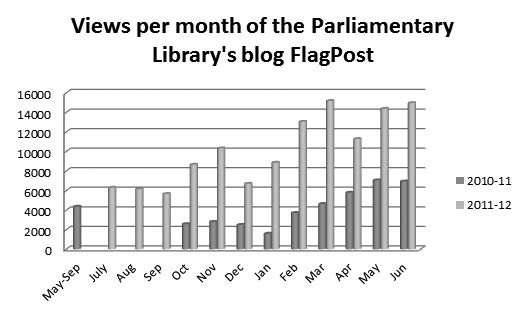
Text version of Figure 7
Digitisation
The Parliamentary Library has large digital collections and has a strategic goal to digitise more material of interest to the Parliament as resources permit.
The Library has archives of paper or pre-digital media audio visual material that it has identified as likely to be of ongoing interest to Members of Parliament. Progressively, this material is digitised and added to the permanent digital collection. This work has commenced on a small scale. In 2011 the Library established a set of criteria for digitisation which were presented to the Library Committee for discussion. The factors that the Library considers when undertaking digitisation projects include:
- current demand—how often are clients requesting the material in its pre-digital format?
- potential use—if the content was more easily accessible would use increase?
- preservation/useability—is the content fragile or likely to be unusable in the foreseeable future?
- costs of digitisation—what can be done at a local level using available staff/
equipment and what is a large scale project that would involve an external provider?
- storage; and
- staff skills.
Digitisation in 2011–12 included:
- press releases: approximately 6,700 historic press releases (1956–1999) were digitised;
- the backset of published Parliamentary Fellowship Monographs;
- radio and television broadcasts: on-demand from clients, individual pre-2004 programs were digitised from analogue recordings; and
- party political documents (party policies, major speeches): this collection had content in print back to the 1900s and online from the 1996 Federal Election. This includes items such as policy documents and campaign launches for the major parties and other parties such as the Australian Democrats and the Greens. The complete Political Party Collection is now digitised, over 3810 items.
Like the digitisation of Hansard, this work makes available to the wider community important documents of Australia’s public life; including policy speeches. Some examples are included below.
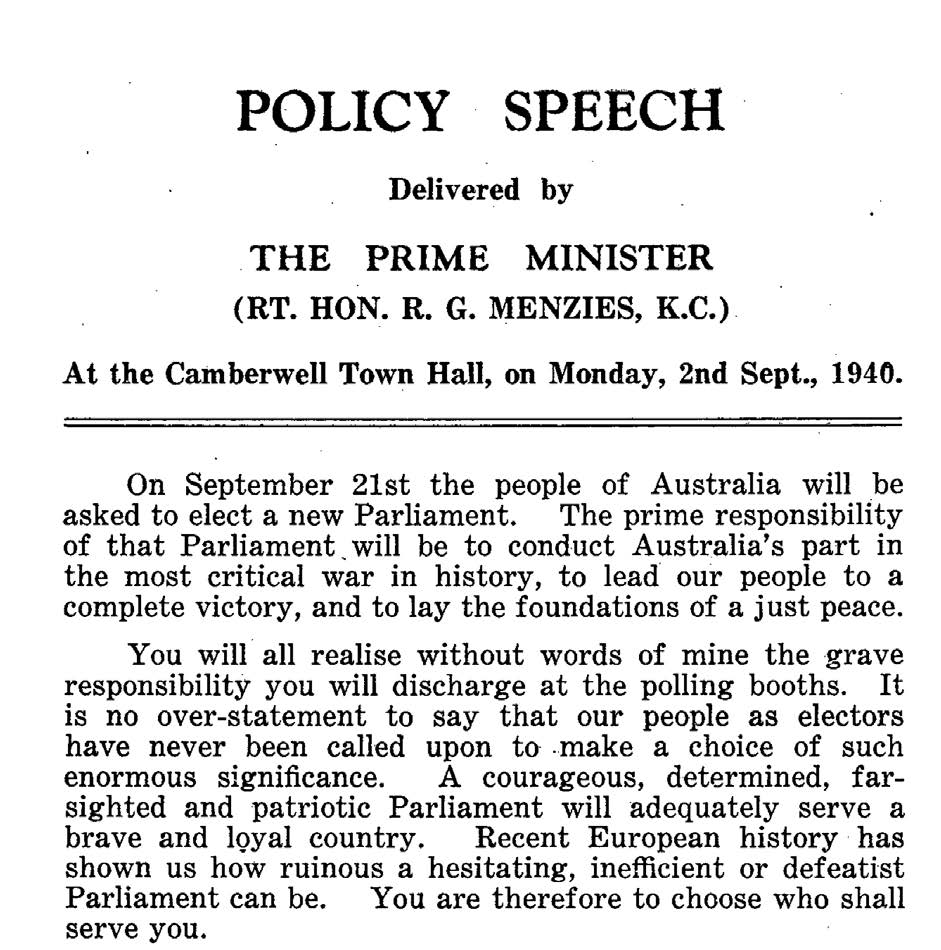
Robert Menzies, General election 1940: policy speech by the Prime Minister,
2 September 1940.
Text version of Policy Speech
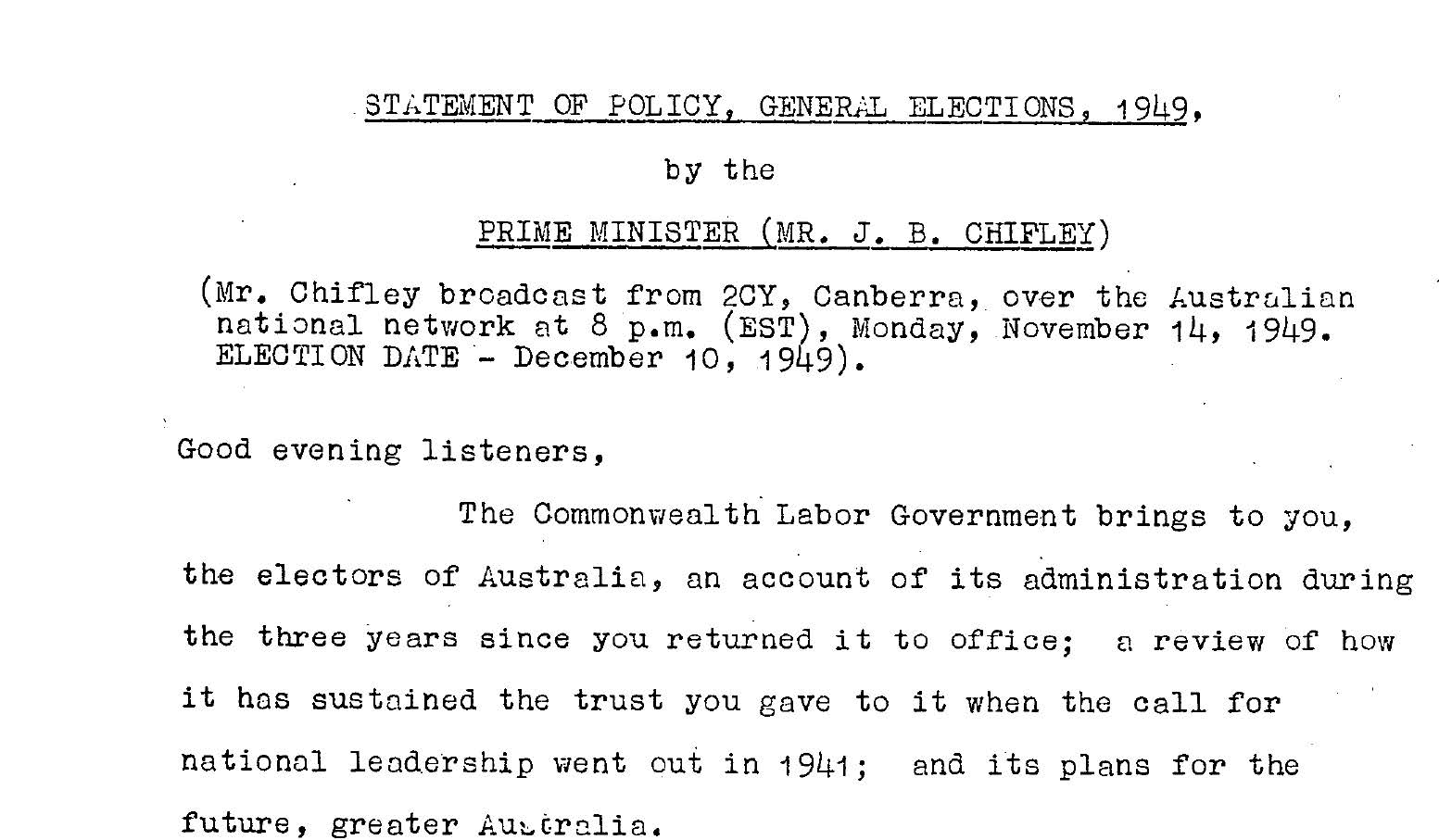
Ben Chifley, Statement of policy by the Prime Minister: general elections 1949,
14 November 1949.
Text version of Policy Speech
Library Accommodation
The Ground Floor Reading Room and adjacent Newspaper Reading Room re-opened on Monday 12 September 2011 following refurbishment. The Ground Floor Reading Room is available after hours to Senators and Members through swipe access using their Parliament House passes. The Newspaper Reading Room is available to all Parliament House passholders 24 hours a day.
Accommodation planning for utilising Library floor space in the main library efficiently and to modern standards in existing and/or new open plan areas commenced in 2009–10. In 2011–12, an area in the Second Floor Main Library commenced refurbishment. This work will be completed in 2012–13.
Support the Parliament’s engagement with the community and democracy
Parliamentary Handbook
The Parliamentary Handbook for the 43rd Parliament was launched in October 2011 by the then Speaker, Mr Harry Jenkins and the Chairs of the Joint Standing Committee on the Parliamentary Library, Mr Dick Adams and Senator Gary Humphries.
The Parliamentary Handbook is now almost 100 years old. In 1915, the first Library Committee of the Commonwealth Parliament recommended that the Parliamentary Library prepare a Commonwealth Parliamentary Handbook which would give short biographies of parliamentarians since Federation along with electoral information and ‘other information likely to be useful’.
The first edition of the Handbook, published in 1915, covered the period of the first six elections and parliaments from March 1901 to September 1914. To date there have been 32 editions of the Handbook, which have documented the 43 parliaments up to and including the current Parliament. This is the 10th edition to have been edited by Martin Lumb, whose involvement with the Handbook dates back to 1986.
Over the years, the Handbook has developed into a comprehensive reference work on many aspects of the Commonwealth Parliament and includes much information on the Australian political system as well.
The biographies in the Handbook became available online for the first time in 1988 when the Commonwealth Parliament moved to its permanent home and modern technology became integral to providing services to Senators and Members. Since 1999, the full text of the Handbook has been available on the Internet and is regularly updated. This latest edition of the Handbook will continue to utilise advances in technology by becoming the first edition to be released as an e-book.
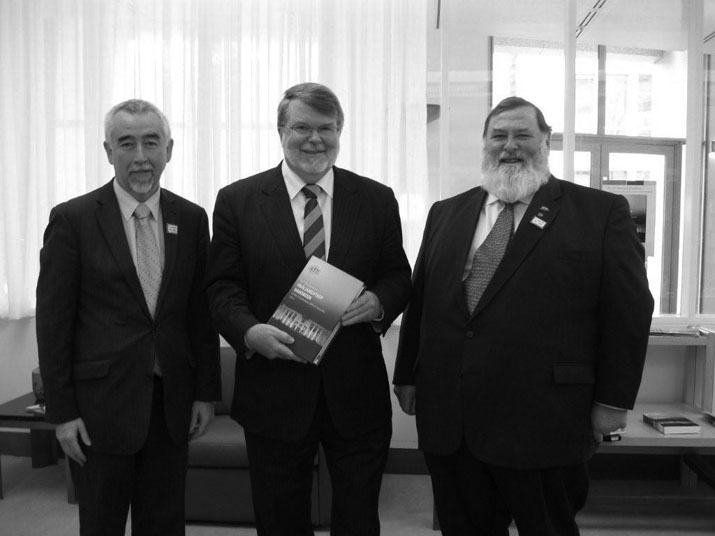
Website
The Library supports the website of the Parliament of Australia (www.aph.gov.au)
through its Publishing section. The Parliamentary Librarian and colleagues from the Chamber departments led the development of a new APH website that went ‘live’ on 17 February 2012. The site provides members of the public with improved access to information about the Australian Parliament, Senators and Members, Hansard, Bills and Committees.
The website aims to support democratic participation through the provision of information to the Australian public and facilitate public access to information about, and communication with, the Parliament, its committees and members.
While the website provides a central view of information relating to the Parliament of Australia, content is shared and owned by each of the three parliamentary departments.
The website also provides access to the suite of parliamentary applications through the use of the “Authorised users | login” facility on the bottom right hand corner of the website homepage. Authorised users can now use this facility to access their desktop and supported applications from any computer via the website.
The department has received positive feedback on Twitter and elsewhere about the look and organisation of the new site. The new site got a thorough and positive review on the Library of Congress law blog http://blogs.loc.gov/law/2012/02/the-australian-parliaments-new-website. The Library used its newsletter, ’What’s New’, to offer clients tips on how best to access information, and also released a guide addressing common queries.
National Sorry Day
In February 2012, the National Sorry Day Committee presented Seven Historical Documents of Truth and Justice to the Australian Parliament in a special ceremony marking the fourth anniversary of the National Apology to the Stolen Generations.
The documents include:
- Petition to King George VI & The Day of Mourning Resolution 1938;
- The Barunga Statement 1988;
- The Report of the Royal Commission into Aboriginal Deaths in Custody 1991;
- The Bringing them home Report 1997;
- The Australian Declaration Towards Reconciliation and Roadmaps 2000;
- United Nations Declaration on the Rights of Indigenous Peoples 2007;
- The Australian Parliament’s Apology to the Stolen Generations 2008.
The documents were presented in a traditional message stick carved by Wiradjuri artist Duncan Smith. The Library is the custodian of this gift, which is on display in the Ground Floor Reading Room.
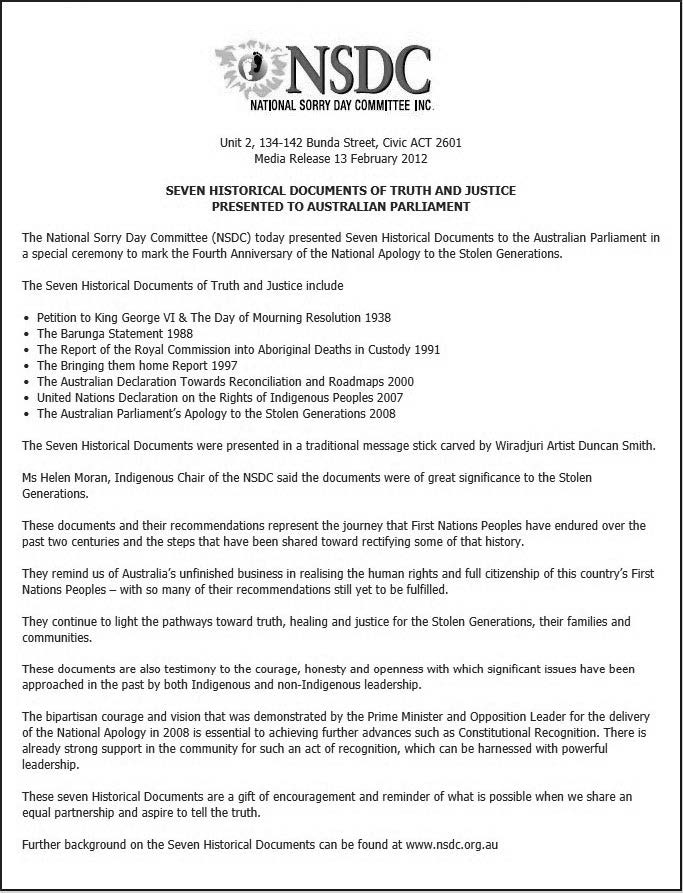
Text version of National Sorry Day Letter
Engagement with other Parliamentary Libraries in Australia and in our region
The Library produced a study of access to online parliamentary information in Australia covering the national and state parliaments. This work was undertaken for the Association of Parliamentary Libraries of Australasia (APLA), a collaborative network of federal and state parliamentary libraries in Australia, New Zealand and Papua New Guinea. The study is published online at: http://www.apla.org.au/information/bm.doc/australian-parliamentary-material-online.pdf
The report provides information on the publication of Hansard, live broadcasting and other parliamentary information products. The study is part of an ongoing program of activities of the association to enhance knowledge and publication of parliamentary resources in print and online.
The Library has also contributed to an APLA project Legislative Libraries: Building a core reference collection as a resource for Pacific Parliamentary Libraries.
The Library is committed to supporting parliamentary libraries in the region, particularly in Pacific countries and in emerging democracies.
In June 2012, the Library participated in a mission sponsored by the Inter-Parliamentary Union to help establish a library, information and research service for the new, 664 member Parliament of Myanmar. Development of a modern, well equipped library and research service has been identified as a priority by the parliamentary leadership, Members of Parliament and parliamentary staff. The mission team comprised Elizabeth Luchetti, Director Collection Management, Parliament of Australia and Avi Marom, Head of Data Communication & Telephony, The Knesset, Israel.
The Library also delivered presentations on its work to a range of parliamentary delegations with representatives from countries including Brunei, Canada, Chile, China, the Gambia, India, Indonesia, Japan, Laos, Malaysia, New Zealand, Tonga, Turkey, UK and the USA.
Use technology to support better services
ParlMap
The Library has replaced its thematic (colour coded) mapping application on the ‘Electorate Atlas’, introduced in 2005, with a modern, flexible, easy to use application to enable clients to draw a map of any electoral division showing Census or voting characteristics.
In the past, only one dataset could be placed on the online user-generated map at any given time.
The new system, which is available through the Library’s intranet:
-
provides improved capability for online user-generated thematic and topographic maps of Australia showing regional information and electoral information for use by Senators and Members and their staff;
-
allows Parliamentary Library and committee staff to use the system to provide information to clients and committees; and
-
is accessible through a range of devices including iPads.
Topographic maps of Commonwealth Electoral Divisions can be overlaid with State Electoral Districts, Local Government Areas and Census Collection Districts. The 2011 Commonwealth Electoral Divisions will also be available for display by the end of the calendar year (including recent redistributions in SA and Vic). Senators and Members are also able to create and print thematic maps using statistical data from the 2006 census (data from the 2011 census will be available in full by November 2012).
Media services: news clips
The Parliamentary Library selects news clips of interest to the parliament, available every day through ParlInfo Search. The Senators’ and Members’ daily news clips service became fully operational in 2011–12. This service uses the Library’s LAST (Library Authoring System and Thesaurus) to automatically select from Australian capital city newspapers against two profiles (one for Senators and one for Members) and publish this content to the Library’s intranet. This service runs automatically seven days a week, with the clips usually available on the intranet before 7:30am.
Media services: radio and television programs
Radio and television programs are currently captured and made accessible using a system that is at the end of its life. The Library’s Electronic Media Monitoring Service is being migrated to a new Audio Visual Asset Management and Archiving System. The system is expected to go into production in late August 2012. User acceptance testing has been completed and Library staff have been fully trained and have developed their own user manuals to assist with a smooth transition to the new production environment. Migration of existing digital content, primarily recordings from 2004 onwards, is expected to be completed approximately three months after going into production.
Client enquiries management
In July 2011, the Library started to use a new system to record client enquiries and other work done by Library staff. The new system is one used by all state libraries in Australia and many university and research libraries. One of the important aspects of the system is access management that ensures access to information about client enquiries is restricted and an audit trail of all access is kept. Historic data has been migrated from the previous Time and Information Recording System and the new system will continue to provide information for the Library Committee and for other reporting needs.
E-books
The Library is now publishing research publications as e-books. The format enables publications to be easily read on devices such as iPads.
In 2011–12, one of the Library’s strategic goals was to increase the collection of e-books to enable Senators and Members and their staff easy access to books in our collection regardless of where they are working.
In March 2012, the Parliamentary Library added OverDrive to its digital resources. OverDrive is a multichannel digital distributor of e-books, audio books, music, and video. To date, OverDrive has developed ‘Virtual Branch’ websites for 13,000 libraries worldwide. OverDrive currently hosts more than 500,000 premium digital titles from more than 1,000 publishers. The product supports iPad, Sony Reader and many other mobile devices. The Library is purchasing from OverDrive’s non-fiction titles and these are available on a single website for browsing, checking out and downloading. Loans are from one to three weeks, and the Library is monitoring usage and purchasing additional copies of items in high demand.
New client service portal
The Library’s client service portal is being re-developed to improve client access to its services. The new portal will use Sitecore as its content management system, in line with the APH website and DPS intranet environments. Development work on the new portal is well under way and it is expected to go live before the end of this calendar year.
Parliamentary Library video and training resources.
The Parliamentary Library provides various training programs including orientations, introductions to particular resources and a Study of Parliament course for the staff of parliamentary departments. We also visit Senators’ and Members’ offices in Parliament House to provide training on request, and provide training by phone on an ad hoc basis.
We have been considering methods of delivering training and inductions online, so that we can reach staff in electorate offices who may not have the opportunity to attend training on site.
With great assistance from Broadcasting, the Library has created a video which provides a short introduction to Library services. It is available for Senators and Members and their staff and the wider community on the Parliamentary Library’s YouTube channel at http://www.youtube.com/watch?v=o2BSgpyAvuE.
The Library has also produced three online training videos to explain the process of setting up a computer/iPad to use OverDrive to download e-books.